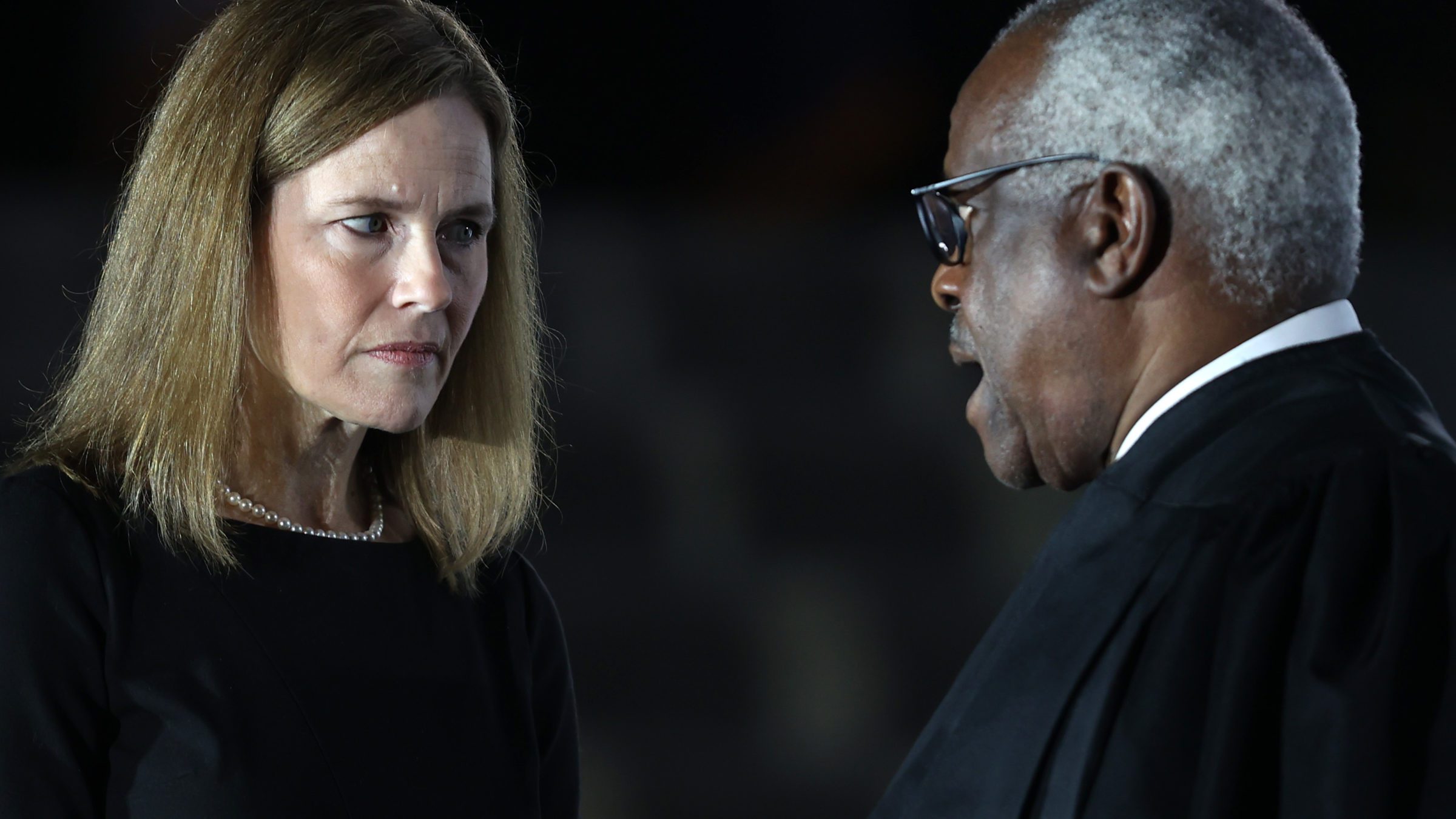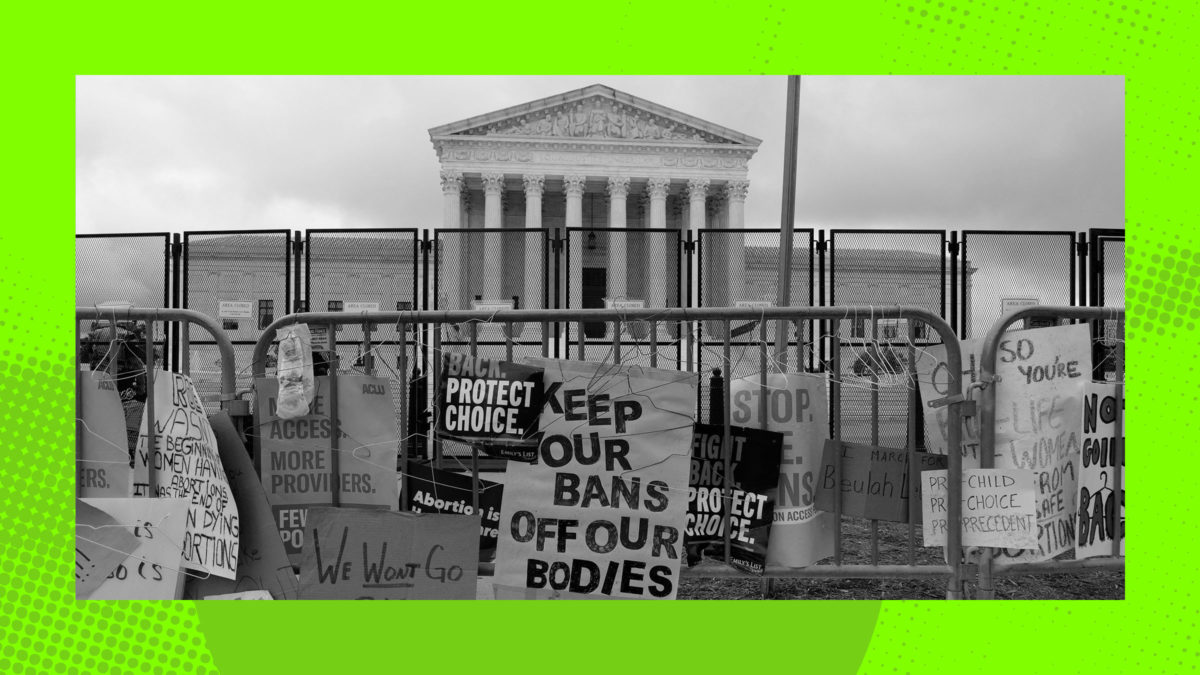The leaked Dobbs v. Jackson Women’s Health Organization opinion is bad on its face, given the fact that Justice Samuel Alito’s writing would gleefully destroy the constitutional right to abortion. But Alito doesn’t stop there, and anti-choice activists have no intention of letting him stop there, either. Instead, these activists are already teeing up their next big legal fight: for the constitutional recognition of fetal personhood.
Below, a primer on how the struggle over reproductive health and bodily autonomy will get much, much worse—and perhaps very, very soon.
What is fetal personhood?
Currently, constitutional rights attach to people who are actually born. Anti-choice activists think those rights should attach to embryos and fetuses, too. The Mississippi abortion restriction at issue in Dobbs, for example, uses the phrase “unborn human being”—a purposeful shift from the language of cases like Roe v. Wade, which discussed “fetal life.”
If you think the movement is limited to fetuses that have attained the possibility of viability outside the womb—around 23 to 25 weeks—you are extremely wrong. Fetal personhood is the idea that every fertilized egg is entitled to full protections of the law, and is a constitutionally-protected entity separate from the pregnant person.
At the federal level, anti-choice activists are already pushing for a national abortion ban in the event that Roe falls. Judicial adoption or legislative codification of fetal personhood would be different and even more consequential, because it would not only restrict (if not outright bar) pregnant people even in blue states from getting an abortion, but would also require them to change their behavior to protect the full-fledged person housed within them. Cranks like Kentucky Senator Rand Paul have been stumping for this idea for a long time; in the House, this year’s version of the “Life at Conception Act” has more than 150 co-sponsors.
The basic problem with fetal personhood is that it is fundamentally at odds with how pregnancy works: People don’t magically know they’re pregnant the second it happens, and thus cannot alter their lives accordingly. Most people don’t realize they’re pregnant between the fifth or sixth week, which is, incidentally, the cutoff for legal abortion in Texas right now. Fetal personhood, in other words, grants rights to someone who no one knows exists yet. And the only way for courts to meaningfully protect these purported rights, of course, is to assert total control over the bodies of people who could get pregnant at all times.
What’s the conservative case for fetal personhood?
Basically, that the courts’ interpretation of the Fourteenth Amendment has been wrong and crabbed for a long time. In an amicus brief in Dobbs, conservative law professors Mary Ann Glendon and O. Carter Snead complain that Roe extended Fourteenth Amendment protections to pregnant people but not to “unborn human beings,” thus placing them “beyond the bounds and protection of our legal system.” (Snead, a professor at Notre Dame Law School, is the same person who wrote an op-ed in The Washington Post promising that liberals had “nothing to fear” from the Supreme Court nomination of his friend of 15 years, Amy Coney Barrett.)
Another pair of conservative professors, John M. Finnis and Robert P. George, argue that if the Court could declare corporations to be persons back in 1886, there is no reason they couldn’t extend the same courtesy to “unborn human beings” today. Sure, they note, fetuses can’t vote or become president, but that’s also true for corporations which the Court has “unflinchingly included” within the scope of rights that are normally reserved for actual people. “The originalist case for including the unborn is much stronger than for corporations,” they conclude, which is as damning an indictment of the Supreme Court’s corporations law jurisprudence as it is of originalism.
How many Supreme Court justices believe in fetal personhood?
Too many. During oral arguments in Dobbs, Alito served up the softest of softballs to Mississippi’s solicitor general, asking him whether there are any “secular philosophers and bioethicists who take the position that the rights of personhood begin at conception or at some point other than viability.” This allowed the solicitor general, Scott Stewart, to reply that, why yes, a “wide array” of people exist “who would reasonably have that view.” This feels like Alito’s clunky method of trying to establish that there are at least some non-religious people who think personhood begins at conception, too, not just conservative Christian supremacists like him.
There are other warning signs in the leaked Dobbs opinion. Take one of Alito’s few approving citations to Planned Parenthood v. Casey, the 1992 case that weakened Roe without oveturning it: that abortion is a “unique act” because it terminates “life or potential life.” At several points, Alito fawningly adopts the language of the Mississippi law that calls fetuses “unborn human beings”—a tacit assertion that a currently-unconstitutional law accurately reflects the factual scientific landscape.
Justice Clarence Thomas, too, seems very comfortable with the uncomfortable issues fetal personhood creates. During oral argument, he tried to shift the conversation with Susan Rikelman, who represented one of the abortion providers, to the overarching issue of control of the bodies of pregnant people. Back in 2001, Thomas was one of three dissenters from the Court’s opinion in Ferguson v. Charleston, which held that a hospital could not drug-test people who had just given birth and allow cops to arrest anyone who tested positive for cocaine.
The implications of fetal personhood for cases like Ferguson were clearly on Thomas’s mind during his exchange with Rikelman more than two decades later. “I understand your argument is about abortion,” he explained. “I am trying to look at the issue of bodily autonomy, and whether or not she has a right also to bodily autonomy in the case of ingesting an illegal substance and causing harm to a pre-viability fetus.” It seems that Thomas not only opposes the right to choose, but is already thinking ahead to what civil rights he could use fetal personhood to curtail next.
Barrett, Thomas’s former clerk, is probably on board, too. In 2006, she signed an open letter sponsored by St. Joseph County Right to Life of people who “oppose abortion on demand and defend the right to life from fertilization to natural death,” which is about as tidy as a summary of fetal personhood can get.

Two old pals just going over some ideas together (Photo by Tasos Katopodis/Getty Images)
What are the potential legal implications of fetal personhood?
If you give fetuses Fourteenth Amendment rights, you’re giving them two distinct things. First is procedural due process, drawn from language that makes it unconstitutional to “deprive any person of life, liberty, or property, without due process of law.” Fetuses would also be covered under the Equal Protection Clause, which bars states from denying “to any person within its jurisdiction the equal protection of the laws.”
If you define fetuses as persons, any abortion law that somehow survives would, at a bare minimum, have to include procedural protections for those persons. Incidentally, this was the law in Alabama for several years whenever a minor sought a judge’s permission to obtain an abortion without parental consent. In that scenario, state law allowed the judge to appoint a lawyer for the fetus, who could cross-examine the minor and call witnesses if they felt like it. (One lawyer appointed in dozens of cases was wildly anti-choice and badgered teens about how God doesn’t want them to kill their baby.) A federal appeals court struck down the law in 2021, but fetal personhood could easily extend this model to anyone seeking an abortion, gumming up the wheels of justice so badly that it would stop abortions from happening even in places that try to allow it.
This jurisprudence of equal rights for fetuses is even more off the rails. In theory, extending to fetuses the same rights that autonomous out-of-womb people have could allow fetuses to bring lawsuits, own property, and get called for jury duty. Tucked within Georgia’s 2019 effort to push a six-week abortion ban, for example, were provisions that would have allowed fetuses to be counted as dependents during tax filing season, and included them in the Census and the redistricting process Given that between 10 and 15 percent of pregnancies end in miscarriage, it’s darkly comical to imagine the ever-shifting tax filing status and population counts that would result.
So what happens to pregnant people under a fetal personhood regime?
Things will get more dangerous, because this country already does so little to ensure that pregnancy is safe for anyone. The United States has the highest rate of maternal mortality among high-income developed countries, and rates are still higher for Black mothers. Those numbers will only get worse if Roe is overturned: A study from Tulane University found that the states with a higher number of abortion restrictions also have a higher maternal mortality rate.
Next, it tees up a surveillance state for pregnant people and people who could get pregnant. Many states already criminalize pregnant people who use drugs, allowing them to be prosecuted for abuse if the child shows evidence of harm after birth. This will, of necessity, have to be stepped up if the fetus is a person at the moment of conception. Over at The Washington Post, professor Rebecca Kluchin explains that fetal personhood will lead to forced medical interventions for pregnant people, including blood transfusions and Caesarean sections. Again, if the fetus is a person, extraordinary measures might be required to protect its attendant rights, regardless of whether the process of doing so is repugnant, dangerous, or both.
What other medications and procedures could be in danger?
Fertility treatments that create excess fertilized eggs and embryos, for starters. IVF involves stimulating the ovaries to create a larger-than-usual number of eggs, which are fertilized in a lab with sperm and then are allowed to develop into embryos. One or more gets implanted in the uterus by a doctor, and the remainder are frozen or discarded. Fetal personhood could render this procedure immediately problematic, as one cannot typically freeze or discard humans.
Banning IVF isn’t necessarily a fringe view in anti-choice circles, even though they might not make specific legal arguments to the Court about it. One anti-choice group filed an amicus brief in Dobbs that focused narrowly on stare decisis issues, but in an interview with The Guardian, the group’s chief legal officer referred to IVF as the “creation and freezing of hundreds of thousands of distinct individual human beings who remain in limbo forever or are ultimately cast off as if the trash.”
The future of birth control would depend on how legislators or courts in your state think birth control works. About a decade ago, the conservative Christian owners of Hobby Lobby craft stores went all the way to the Supreme Court so they didn’t have to provide birth control to their employees, arguing that two types of birth control—intrauterine devices and the morning-after pill—are abortifacients that destroy a fertilized egg.
The Court, in ruling for Hobby Lobby, didn’t decide the factual question of whether those methods are abortifacients, and instead ruled that Hobby Lobby’s owners’ sincere belief was enough to allow them to opt out of the legal requirement to provide coverage. If a state (or the entire country, if Rand Paul has his way) gets a personhood law, at least those two methods of birth control could come under renewed legal scrutiny, if not be outlawed altogether.
Have states already passed fetal personhood laws?
For now, personhood laws are generally unconstitutional under Roe because they block abortions at all stages of pregnancy. But if the eventual Dobbs opinion overturns Roe, states that have flirted with the idea of fetal personhood will likely do so again.
Alabama and Georgia, for example, have previously passed laws that relied upon fetal personhood to ban abortion; neither law is currently in effect, but not for lack of trying. Earlier this month, the Oklahoma House passed a complete ban based on personhood before settling for a six-week Texas-style ban instead; weeks later the state legislature passed a near-complete ban that the governor is expected to sign. Meanwhile, Louisiana legislators are pushing a law that would make abortion a homicide no matter what the Court does to Roe, and calls for the impeachment and removal of state judges who try to block its implementation.
This isn’t new. Colorado had fetal personhood ballot initiatives back in 2008 and 2010. While voters resoundingly rejected both measures, they sparked movements elsewhere. In 2011, Mississippi’s fetal personhood initiative collapsed only after the widespread realization that it would significantly affect, if not outright bar, birth control and IVF. Oklahoma tried to get a fetal personhood measure on the ballot in 2014, but the state supreme court declared it unconstitutional. That same year, North Dakota voters rejected a ballot initiative that would have added personhood language to the state constitution.
That’s hardly an exhaustive list. Over two dozen states are poised to ban abortion when Roe falls, and much of the rhetoric around these bans has focused on life “beginning at conception.” Without federal constitutional protections for the right to choose, some form of fetal personhood is inevitable in many states. The only remaining question is how much more harm this next phase of the conservative legal movement will inflict.

